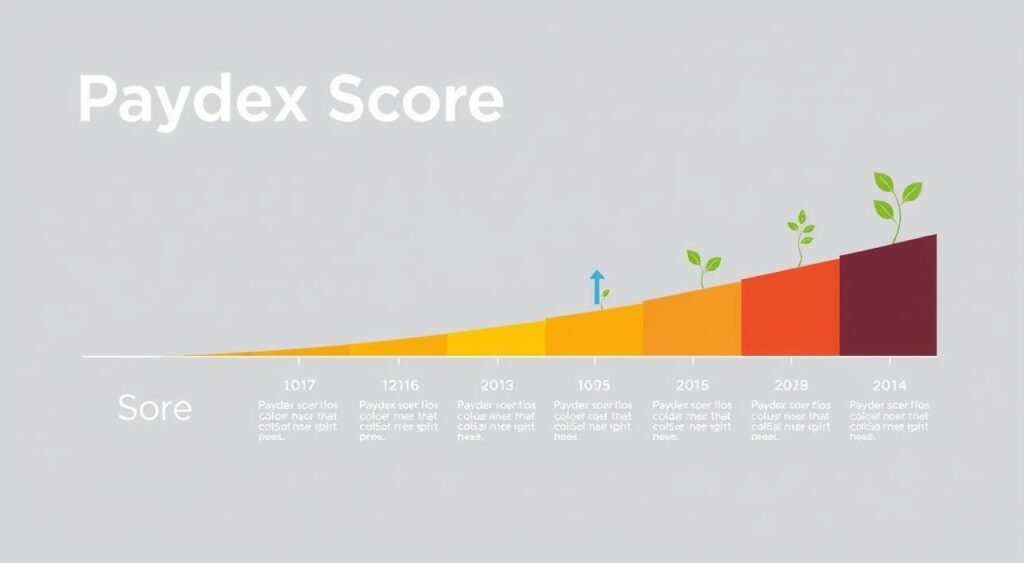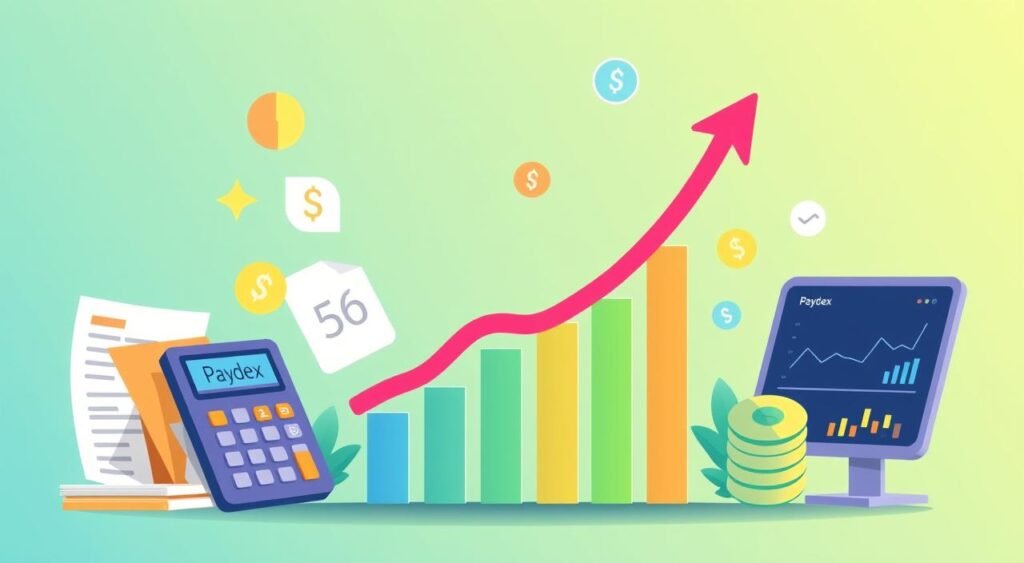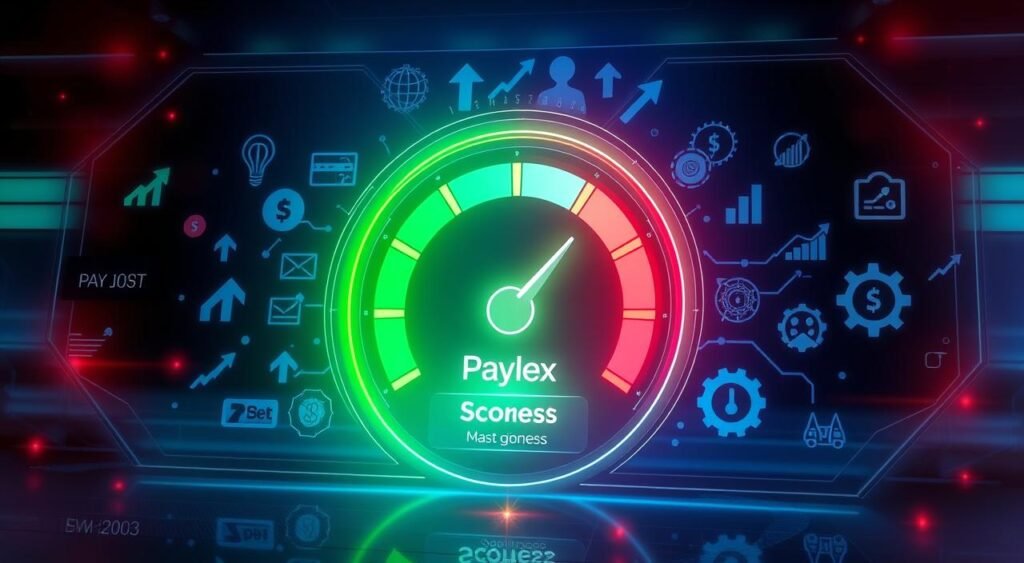Have you ever thought about how your business is judged for creditworthiness? The Paydex score1 is key. It shows how reliable your payments are and how stable your finances are. But do you know how important this score is for getting loans, working with vendors, and growing your business?
Key Takeaways
- The Paydex score ranges from 1 to 100, with higher scores indicating better payment performance1
- Businesses need a D-U-N-S number and payment history with at least four vendors to obtain a Paydex score1
- Paydex scores play a crucial role in lending decisions, vendor relationships, and overall business creditworthiness
- Understanding and maintaining a strong Paydex score can unlock significant advantages for your company
- Monitoring and improving your Paydex score should be a top priority for any business owner
What is a Paydex Score?
The Dun & Bradstreet PAYDEX score rates a company’s2 payment history and creditworthiness. It ranges from2 1 to 100. A higher score means a business pays bills on time or early2.
A good Paydex score is key. It shows lenders, vendors, and partners if a company is financially stable and reliable.
Explaining the Dun & Bradstreet PAYDEX Score
Dun & Bradstreet, a top business credit reporter, calculates the PAYDEX score3. It goes from 0 to 100, with higher scores meaning better payment history3. To get a PAYDEX score, a business needs a D-U-N-S number and at least two tradelines with three or more credit experiences3.
The Importance of a Business Credit Score
A company’s Paydex score is key to its financial health and success4. Dun & Bradstreet uses this score and other financial data to guide lenders on credit limits4. A high Paydex score also means better financing, favorable trade terms, and more trust from stakeholders3.
In short, the Paydex score is a powerful tool for businesses. It shows their creditworthiness and financial responsibility. This can greatly help in getting financing, building strong vendor relationships, and achieving long-term success234.
How is the Paydex Score Calculated?
The Paydex score is made by Dun & Bradstreet. It looks at a company’s payment history from the last 12 months5. This score is an average of payment experiences, with recent payments counting more5.
It also considers the size of each payment. This means big payments have a bigger impact on your score5. Paying big invoices on time can boost your score more than small ones5.
Payment History: The Key Factor
The Paydex score goes from 0 to 100. A score of 100 means you’re expected to pay right away5. Each score level shows different payment habits, like paying on time or late5.
Dun & Bradstreet gets its data from over 12,000 trade exchanges worldwide5. In the US, they have about 4,200 participants as of December 20105. From 2005 to 2010, the number of trade experiences on US businesses jumped by 82%5.
The number of US businesses with at least one trade also rose by 69%5. Businesses with three or more trades saw a 57% increase5.
Dollar-Weighted Scoring Method
The Paydex score uses up to 874 trade experiences5. It compares payments to terms and weighs them by dollar amount5. If there’s not enough data, it shows “unavailable” in the monthly Paydex5.
Small businesses with three or more trades have seen an 80% increase5. The Paydex score is dollar-weighted. This means bigger payments affect your score more6.
Factors Impacting Your Paydex Score
Your business’s Paydex score is shaped by several important factors. Payment history is the biggest one7. A score of 75 or higher means you pay on time, showing low risk. Scores under 75 might mean you’re late sometimes7.
How many trade experiences you have also matters. More vendors and suppliers reporting your payments can help your score7.
Outstanding balances and how much credit you use are also key. Paying off debts quickly and not using too much credit can boost your score7. A longer history of paying on time shows your business is reliable7.
- Payment history: The most important factor, with on-time and early payments boosting your score78
- Number of trade experiences: More vendors and suppliers reporting your payment history can improve your score7
- Outstanding balances and credit utilization: Maintaining low balances and using a small portion of your available credit can positively impact your score7
- Length of business credit history: A longer track record of timely payments demonstrates your company’s reliability7
Understanding these factors can help you improve your Paydex score. This can greatly benefit your business.
Minimum Requirements for a Paydex Score
To get a Paydex score, your business needs a D-U-N-S number from Dun & Bradstreet (D&B)9. You also need at least two tradelines, like accounts with vendors and suppliers, that report to D&B10. These can be net 30 accounts, business credit cards, or other vendor relationships that D&B tracks10.
Establishing Tradelines
Having a variety of tradelines is key for a good Paydex score10. Lenders and suppliers like businesses that pay on time, shown by a high Paydex score9. By getting different tradelines to report to the credit bureau, you show you’re creditworthy. This can help you get better terms and opportunities.
Reporting to Dun & Bradstreet
Your vendors and suppliers must report your payments to Dun & Bradstreet10. This data is the base of your Paydex score, as D&B uses it to judge your creditworthiness9. To get accurate reports, consider D&B’s CreditBuilder Plus or CreditBuilder Premium. They help improve your Paydex score by submitting payments10.
Meeting the Paydex score requirements helps build a solid business credit profile. It opens doors to better financing, vendor relationships, and negotiating power.
Using Your Paydex Score
Your Paydex score is key for lenders, creditors, and vendors to check if your business is trustworthy11. A higher score means you’re less likely to pay late11. Scores between 80 and 100 show you’re low-risk. Scores from 50 to 79 mean you’re at medium risk, and below 50, you’re high-risk11.
Lending Decisions
Your Paydex score affects your chances of getting business loans12. Lenders look at your Paydex score, Dun & Bradstreet’s Business Credit Score, and Financial Stress Score12. A good Paydex score means you’re reliable with payments, helping you qualify for loans and credit12.
Vendor and Supplier Relationships
Your Paydex score is also important for vendor and supplier relationships12. Vendors use Paydex, Experian’s Intelliscore Plus, and Equifax’s Credit Risk and Business Failure Scores11 to decide on credit terms. A high Paydex score can get you better payment terms, improving your cash flow. But a low score might lead to less favorable terms, making it hard to get what you need for your business1112.
Knowing how to use your Paydex score is vital for your business’s success1112. A strong Paydex score opens doors to better financing and vendor deals, giving you an edge in the market1112.
Interpreting Paydex Score Ranges
Knowing your Paydex score is key to understanding your business’s creditworthiness. The score ranges from 0 to 100. Higher scores mean better payment habits13.
A score of 80 to 100 is top-notch. It shows your business pays bills on time or even before they’re due. Scores from 50 to 79 are good to fair. They mean your company usually pays on time but might be late sometimes13.
But, a score under 50 is a red flag. It means your business often pays late or has unpaid bills. This can hurt your chances of getting loans or good deals from suppliers13.
| Paydex Score Range | Credit Performance | Implications |
|---|---|---|
| 80 – 100 | Excellent | Consistent on-time or early bill payments |
| 50 – 79 | Fair to Good | Generally on-time payments with occasional late payments |
| 0 – 49 | Poor | History of late payments or delinquent accounts, making it difficult to secure financing or favorable trade terms |
Understanding Paydex score ranges helps you see how good your business’s credit is. A high score is vital for getting loans and keeping good relationships with suppliers13.

Your Paydex score shows how financially healthy and trustworthy your business is. Keeping a strong score opens doors to more opportunities for growth14.
Paydex Score
The Paydex score is a special credit score made by Dun & Bradstreet. It looks at how well a company pays its bills and if it’s trustworthy15. Scores range from 1 to 100, with higher numbers showing better payment habits and less risk of late payments15. A good Paydex score is key for getting good loans, better deals with suppliers, and earning trust from partners15.
To get a Paydex score, a company must have at least four payments reported on its Dun and Bradstreet credit file15. Things that affect a company’s credit include its highest credit limit, payment history, and how long it’s been in business15. A score of 80 or higher is like having a personal credit score of 720, which is considered good15.
But, having an 80 Paydex score doesn’t mean you can get all the credit you want. You also need a solid payment history and a good credit profile with all three major agencies15. Still, a score of 80 or higher can help you get net 30 and net 60 accounts with suppliers15.
Knowing about the Paydex score is very important for business owners. A strong Paydex score can lead to better loans, better deals with suppliers, and more trust from partners. This can help your business grow and succeed151617.
A good Paydex score is 80 or higher, showing a company is likely to pay on time and without outstanding debts. This reflects stability and a good reputation16.
“Having a Paydex score of 80 does not guarantee access to extensive credit without other positive factors such as solid payment track record and credit profile with all three major business credit reporting agencies.”15
Building and Improving Your Paydex Score
To improve your Paydex score, start by paying your vendors and suppliers on time. Paying bills early can also help a lot. This way, you can greatly increase your Paydex score18.
Also, opening accounts with vendors that report to Dun & Bradstreet can strengthen your credit. This will make your Paydex score more robust18.
Timely Payments: The Key Strategy
The Paydex score ranges from 0 to 100. A higher score means better payment habits18. To get a good score of 80 or more, pay bills on time or early18.
The Paydex score shows how well a company pays its bills. It’s important for lenders and partners to see this18.
Establishing More Tradelines
Opening new tradelines can also improve your Paydex score18. You need at least three payments from two tradelines to get a score10. More vendor relationships that report to Dun & Bradstreet show a reliable payment history. This leads to a higher Paydex score.

To sum up, improving your Paydex score involves timely payments and more tradelines. By doing these, you boost your creditworthiness. This opens up many benefits of a strong Paydex score1810.
“A good PAYDEX score is typically considered to be 80 or above.”18
Benefits of a High Paydex Score
A high Paydex score, usually 80 or above, brings many benefits to your business19. It shows your business pays bills on time, which helps with getting loans and working with vendors19.
Better Financing Options
With a strong Paydex score, you’re more likely to get better loans. This means lower interest rates and more favorable terms20. Lenders see high Paydex scores as a sign of reliability, making your business more attractive for financing13.
Negotiating Power with Vendors
A high Paydex score also helps when dealing with vendors20. It shows you’re reliable with payments, allowing for better terms. This can lead to discounts and longer payment periods, improving your cash flow and vendor relationships20.
Keeping a high Paydex score opens doors to better financing and vendor deals. It’s key to your business’s financial health and growth192013.
Monitoring and Maintaining Your Score
Keeping an eye on your paydex score is key for your business’s financial health21. The Paydex Score ranges from 1 to 100, showing how well you pay bills on time21. To keep your score high, check your Dun & Bradstreet report often for errors and fix any issues that could hurt your score21.
Making timely payments and growing your tradeline portfolio are important21. A Paydex Score above 80 means you’re low-risk, and a score of 75 is good for smooth business operations21. Scores from 80 to 100 show you’re reliable and trustworthy to lenders and partners21.
Watching your Paydex Score and fixing any problems keeps your business credit health strong21. Being proactive with credit profile management can improve your Paydex Score and bring many benefits to your business21.

“Maintaining a high Paydex Score is crucial for the long-term success and financial stability of your business.” –22
Dun & Bradstreet (D&B) has a huge database of over 250 million firms worldwide22. Their PAYDEX score, from 1 to 100, shows how well a business pays bills, with higher scores meaning less risk22.
By watching your Paydex Score and working to keep or boost it, you make your business more appealing to lenders and partners2122. This helps your business grow and stay financially stable in the long run2122.
Paydex Score vs. Other Business Credit Scores
The Paydex score is just one way lenders and vendors check if a business is trustworthy23. Other big names like Experian Business and Equifax Business also have their own scores23. Knowing how the Paydex score stacks up against these can help you see where your business stands and where you might need to improve.
The Paydex score is a 100-point number that shows how reliable a business is with payments23. Equifax’s Business Credit Risk Score goes from 101 to 992, with lower numbers meaning a business might not pay on time23. Equifax also has a Business Failure Score, from 1000 to 1610, which shows the risk of a business going bankrupt23.
Experian’s Business Credit Score is from 0 to 100, with different ranges for risk levels23. Experian also has a Financial Stability Risk Rating, from 1 to 5, which shows how likely a business is to face financial trouble in the next year23.
| Credit Metric | Score Range | Interpretation |
|---|---|---|
| Paydex Score | 0 – 100 | |
| Equifax Business Credit Risk Score | 101 – 992 | Lower scores indicate higher risk of delinquency or charge-off23 |
| Equifax Business Failure Score | 1,000 – 1,600 | Lower scores indicate higher risk of business failure23 |
| Experian Business Credit Score | 0 – 100 |
|
| Experian Financial Stability Risk Rating | 1 – 5 | Lower ratings indicate lower risk of bankruptcy or severe financial distress23 |
This table shows the Paydex score is not the only game in town23. By comparing it to other scores, you can get a better picture of your business’s credit health23.
To get a PAYDEX score, your business needs a Dun & Bradstreet number or a DUNS number7. The score is from 1 to 100, with 75 and above being good for showing timely payments7. Scores below 75 might mean a higher risk of late payments, and anything below 40 is considered very poor7.
In short, the Paydex score is important but not the only thing lenders look at23. By comparing it to other scores, you can understand your business’s credit better and find ways to improve23.
“Monitoring and understanding your business credit scores, including the Paydex score, is crucial for maintaining a healthy credit profile and accessing the financing and vendor relationships your company needs to thrive.”
Conclusion
The Paydex score is key for businesses to grasp and manage. A high score means you pay on time and are financially responsible. This can lead to better loans, stronger vendor ties, and more trust from others25.
By setting up tradelines and paying bills on time, you can keep a high Paydex score. This score is vital for your company’s financial health and growth2526.
A Paydex score between 80 and 100 shows your business is reliable and trustworthy. It helps you get loans, credit lines, and better deals from suppliers2526. Keeping an eye on your credit report and fixing any issues quickly is important25.
In the end, the Paydex score is a powerful tool for your business’s financial well-being. Focus on timely payments, build strong vendor relationships, and keep your credit in check. This way, you can get better financing, strengthen partnerships, and set your business up for success2526.
FAQ
What is a Paydex Score?
Why is the Paydex Score important?
How is the Paydex Score calculated?
What factors can influence my Paydex Score?
What are the minimum requirements to get a Paydex Score?
How is the Paydex Score used?
What do different Paydex Score ranges mean?
How can I build and improve my Paydex Score?
What are the benefits of a high Paydex Score?
How do I monitor and maintain my Paydex Score?
How does the Paydex Score compare to other business credit scores?
Source Links
- PAYDEX Business Credit Score: See What Yours Means – https://www.creditsuite.com/blog/decoding-the-paydex-business-credit-score/?srsltid=AfmBOoqYDBF7I99e-1inutTsNErfZRjf9D5Gt3VYAfnJ8nUQw_fNJNYc
- Understanding the Paydex Score – https://www.businessinsider.com/personal-finance/credit-score/what-is-paydex-score
- PAYDEX Score: The Dun & Bradstreet Business Credit Rating – https://ramp.com/blog/what-is-a-paydex-score
- PAYDEX Business Credit Score: See What Yours Means – https://www.creditsuite.com/blog/decoding-the-paydex-business-credit-score/?srsltid=AfmBOoq8YwtTPiH-NOS4b0FqQ96Faq0I0C2uctay9m7me04aGZwoqnM5
- The PAYDEX score is calculated by the Trade algorithm which examines individual experiences, classifies them into various classes, weights them according to the dollar amounts for each category and then multiplies by the individual index weight to comput – https://docs.dnb.com/static/doc-uploads/supplier/en-US/support/FAQs.pdf
- What Is A Paydex Score? | Bankrate – https://www.bankrate.com/credit-cards/business/what-is-paydex-score/
- PAYDEX Score: The Dun & Bradstreet Business Credit Rating – https://www.nav.com/business-credit-scores/dun-bradstreet-paydex/
- Paydex Score: Everything You Need to Know – https://paymentcloudinc.com/blog/paydex-score/
- D&B PAYDEX Score FAQ – Business Credit Score Guide – https://northshoreadvisory.com/business-credit/business-credit-scores/dnb-paydex-score-faqs/
- PAYDEX Score: The Only Ultimate Guide You Need To Read – https://www.forbes.com/advisor/credit-score/paydex-score/
- Free Credit Score for Business: Get PAYDEX Score Free – https://www.creditsuite.com/blog/free-credit-score-for-business/?srsltid=AfmBOorQ8r3jo9IDERE6LlkHUu1KFTAnRusLQlc3NtkQr2iwkzMaZgYo
- PAYDEX Business Credit Score: See What Yours Means – https://www.creditsuite.com/blog/decoding-the-paydex-business-credit-score/?srsltid=AfmBOoo_lE2BtDlhVLuwfEuk8P7c8eCm42Ww1vSld1MYn3e1FLFTcT8d
- What Is a Good Business Credit Score? | Nav – https://www.nav.com/resource/what-is-a-good-business-credit-score/
- Understanding Business Credit Scores – Credit Strong – https://www.creditstrong.com/business/business-credit-scores/
- Will 80 Paydex Scores Really Open the Business Credit Floodgates? – https://businesscreditblogger.com/2011/04/25/paydex-scores/
- How to Check Your Business Credit Score | TRUiC – https://howtostartanllc.com/business-credit/how-to-find-business-credit-score
- Paydex | HighRadius™ | Autonomous Finance | A/R Management Software – https://www.highradius.com/glossary/paydex-meaning-and-definition/
- How to Get a PAYDEX Score of 80: The Essential Guide – https://www.unitedcapitalsource.com/blog/paydex-score-80/
- What is PAYDEX Score | Gaviti – https://gaviti.com/glossary/paydex-score/
- PAYDEX Score: The Only Ultimate Guide You Need To Read – https://www.linkedin.com/pulse/paydex-score-only-ultimate-guide-you-need-read-echeckplan-6qgze
- Your Ultimate Guide To Know About Paydex Score. – https://www.paycron.com/blog/your-ultimate-guide-to-know-about-paydex-score-read-to-know-more
- Everything about Business Credit Scores | Credit Suite – https://www.creditsuite.com/business-credit/scores/?srsltid=AfmBOopkp5EXNi9QtiAZNTsCgQvzIeywtsIFEA_MgIXikgoHRfiL-loZ
- Understanding the Three Major Business Credit Bureaus – https://www.score.org/resource/article/understanding-three-major-business-credit-bureaus
- How to Check Your Business Credit Score: PAYDEX Score & More – https://www.creditsuite.com/blog/how-to-check-your-business-credit/?srsltid=AfmBOorHQyj6bFuKKpNGQ4RFNbmw_1RcjAJ3eIvne0h_M-PfrsPbf8sc
- Understanding the PAYDEX Score: Your Business’s Credit Score 📊🏢 – https://www.linkedin.com/pulse/understanding-paydex-score-your-businesss-credit-paul-a-damiano-l3t4e
- Paydex Scores: Your Key to Small Business Financial Success. – https://www.paycron.com/blog/unlocking-financial-success-a-comprehensive-guide-to-paydex-scores-for-small-businesses


Pingback: Boost Your Business with a PAYDEX Score of 80 or Above - Paydex Score 80